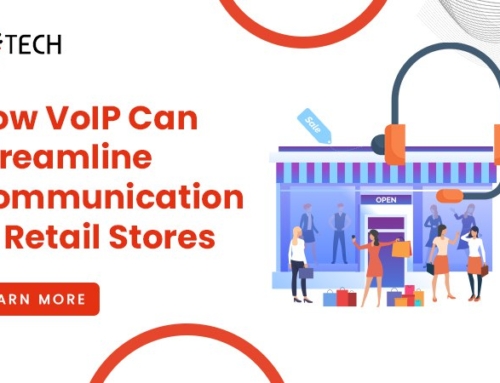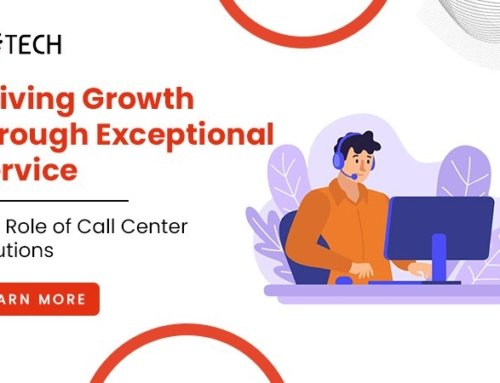Call center VoIP communication is a very effective solution for call centers. It enhances your communication system and also increases the customer experience.
Over the last decade, call centers have undergone significant transformations. They’ve progressed from being a required cost center with entry-level employees to becoming a key driver of brand distinctiveness, revenue development, and customer happiness. You’re behind the times if you haven’t upgraded your call center experience.
Your call center can be transformed by implementing voice over Internet protocol (VoIP) technology. Switching to a hosted PBX solution can save call center owners money, and consumers and call center agents will appreciate the multitude of capabilities that are just not available to call centers using outdated phone systems. Let’s look at what VoIP is and how it can help your contact center reach new heights.
What do you mean by VoIP?
VoIP (Voice over Internet Protocol) is a technique that converts voice into digital signals that may be delivered over the internet as digital data packets over your local area network/WAN/other infrastructure to enable phone calls. To ensure that these packets arrive on time, VoIP employs RTP (real-time protocol). For VoIP, you can connect by ethernet cable or high-speed WiFi.
However, the quality of your VoIP calls is determined by your Internet connection, which could cause problems. To avoid this, we propose that you examine your Internet speeds and see if you need to upgrade your Internet plan before investing in VoIP for your contact center phones.
Overall, VoIP phone systems are seen as a modern upgrade to old landlines, and call centers all over the world employ them to improve the efficiency of their operations.
Advantages of VoIP
Lower Prices
Every call center, big or small, relies on its bottom line. As a result, you must consider all possible cost-cutting measures. Adopting a VoIP phone system is one option for businesses to enjoy significant cost reductions.
Savings on indirect costs
Although indirect savings are more difficult to calculate, they are no less important to your company. The following are some of the most typical places where businesses can save money over time.
Accessibility Improvements
Aside from cost savings, one of the most significant advantages of VoIP for business is accessibility. The flexibility to make calls from anywhere is a major advantage of cloud-based VoIP services.
You can make and receive call center calls if you have a good data connection. You can also forward calls to another person or have voicemails emailed to you if you are unable to answer the phone. One of the most well-known advantages of VoIP is the ability to take your call center phone with you wherever you go using only a softphone software.
Remote accessibility allows us to remain adaptable in an increasingly mobile workforce. Mobile workers can stay productive no matter where they are.
Portable in every way
A virtual number, or VoIP number, is totally transferable. This means you can call the same number from anywhere.
This should be especially good news for frequent travelers. Even better, if your company relocates, you can keep the same VoIP phone number.
Good Voice quality
A strong connection with adequate bandwidth is essential for high-quality VoIP calls. It can be a nightmare if you don’t have this, especially if your workplace is frequently on the phone at the same time. Everyone else suffers from echoes, delays, and background noise because someone calls in on their cell phone.
VoIP phones eliminate these distractions, allowing you to concentrate on the meeting’s agenda. VoIP phones can reach higher voice quality thanks to innovations like noise-canceling microphones and advanced audio compression.
Multitasking is encouraged
VoIP allows you to share documents, photographs, and videos while chatting, in addition to traditional phone chats. As a result, you’ll be able to hold more integrated meetings with clients or colleagues all across the world.
Enhanced Security
Most consumers don’t want to spend more time than necessary thinking about their phone system’s security. Security of phone systems is critical, especially for corporations. Personally identifiable information (PII) has never been in such high demand.
A common access point is to deceive employees by making false phone calls, also known as social engineering.
VoIP can help to decrease security risks by utilizing IP technology developments like encryption and improved identity management. Hosted VoIP services defend their networks around the clock so you don’t have to.
Futures of VoIP communication for call center
Demand for unified communications is growing
The integration of technologies such as hosted VoIP phones, audio/video conferencing, instant messaging, and file-sharing into a single platform administered by a provider is known as unified communications. This effectively streamlines a company’s communication infrastructure, allowing users to quickly locate specific connections and collaborate with their teams.
Visibility of KPIs
Missed call percentages by person or department, for example, can assist managers in ensuring that staff is active and that leads, customers, vendors, and other points of contact receive adequate communication. Other employee-centric statistics such as call times, the average time to answer, availability, and more assist business managers in managing their employees and maintaining high efficiency. All of this information may be shown in a single, customizable dashboard, and managers can pick and choose which statistics they want to see.
Furthermore, VoIP technology may be integrated with Outlook, CRMs, and other business systems, allowing managers to maintain track of client interactions. Which clients have called about the same issue multiple times? How many times have you called a promising prospect? Managers can use relationship-centric KPIs to track and streamline sales, customer service, and other activities.
Additional Customizability
Businesses are rarely stagnant, and their evolution can be unpredictable. Call center VoIP gives organizations the flexibility and customizability they need to adapt to changing circumstances, whether they’re expanding, downsizing, or moving sites.
call centers aren’t bound by physical infrastructure because VoIP phone lines are virtual; managers can easily add and remove customers to scale their phone service to their workforce. For businesses using contact center VoIP, expanding or adding office locations is a breeze; all they have to do is increase their VoIP subscription and purchase new VoIP-standard equipment, skipping the lengthy installation process and keeping inter-office transfers and other handling capabilities streamlined and efficient.
Employees who use VoIP on the internet can make and receive calls on their smartphone, laptop, or desktop, allowing them to work from almost anywhere. This allows businesses to meet varied demands and changing schedules – and in an environment where remote work policies are becoming more popular, a cloud PBX may give businesses the flexibility they need to stay current and attract new employees.
Customer Service at the Call Center
More than their size contributes to the success of call centers that provide excellent customer service. Outstanding customer service necessitates hardworking staff who are supported by thorough training, close performance monitoring, and useful tools.
Apart from detailed reporting and customizability, VoIP for contact centers provides other important advantages for training and monitoring workers. For example, “Whisper” allows managers to counsel employees while they’re on the phone, with the option to “barge” in and provide hands-on support if needed. These capabilities, as well as priority-based call routing, agent availability statuses, and others, can aid in the onboarding of new staff without jeopardizing customer service.
Additionally, VoIP-CRM connections call center in managing client interactions and personalizing calls. Employees can instantly adapt calls to each caller with centralized phone call notes, client information, purchase history, and other data at their fingertips, ensuring a positive customer experience.
IVR menus also expedite the call process by routing callers to the most relevant department. This helps shorten calls and keep consumers satisfied — just make sure the IVR menu is simple and straightforward. Limit main menu options to five or less, reduce sub-menu options, and always allow callers to bypass the menu and speak with an agent by pressing zero. A poorly constructed IVR menu might annoy customers, rather than strengthen a call center’s customer service image.
Lower Prices for Superior Service
VoIP service is, surprisingly, less expensive than most landline solutions. Although it may appear contradictory, internet-based technology allows manufacturers to provide subscriptions at significantly reduced pricing. Furthermore, digital services have the capacity to upgrade on a constant basis, thereby keeping technology from aging — there is no need to spend money on major infrastructure upgrades to stay current with the latest technology.
Better yet, VoIP can modernize more than just a company’s phone lines; from messaging to email-based VoIP faxing, VoIP provides businesses with cutting-edge technology at a fraction of the cost of antiquated service.
Why VoIPTech solutions are best for VoIP communication
Because VoIPTech solutions communication software is affordable, call centers of all sizes may deliver advanced communication services to their callers, resulting in better customer service. Since 2017, VoIPTech solutions have been providing unique communication solutions to complicated challenges. Let’s talk if you’re interested in switching to a VoIP communication call center solution. Our team is ready here to talk with you and solve your problem and helps to increase your revenue.







